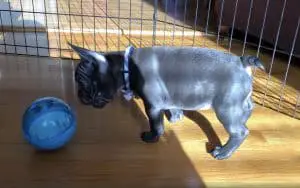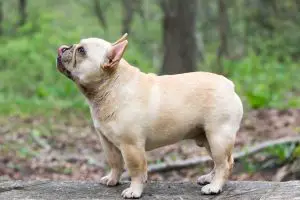As a French Bulldog owner, you were probably surprised when you first saw your furry pet eating grass. Perhaps you are one of those who were not surprised at all. However, nibbling on fresh green grass is something that almost all dogs do.
Have you ever wondered if your dog might be allergic to grass? Namely, these types of allergies are very common, similar to tree pollen allergies in humans. Find out below what to do if your bulldog is allergic to grass.
How Can My French Bulldog Be Allergic To Grass?
We assume that you are familiar with the fact that there is almost no person who is not allergic to something, but guess what, your dog can suffer from allergies too.
The worst part is that the source of the allergy will not always be obvious. Owners often notice that their French Bulldog is biting its paws, and scratching itself to the point of pulling out its own fur or creating open, bloody wounds.
Unfortunately, the tests will not always be able to indicate the cause of the allergy, it is necessary to look at the environment around your pet. Therefore, we recommend paying attention even to the grass where your Frenchie plays.
Although many will be surprised to hear that their furry family member can be allergic to grass, the reason is one of the most common causes of seasonal allergies in humans – pollen, the powdery yellow material that you see all over everything in the spring and summer.
Pollen is actually a substance released by flowers and grasses to be carried from plant to plant by birds, bees, or the wind. Scientists have proven that there are several of the most common ways your dog can be exposed to grass pollen, and these are:
- Absorbed through the dog’s skin
- Inhaled directly into the lungs
- Brought into the house by the owner or other pets
- Licked off the fur
Grass allergy symptoms in your French Bulldog
Keep in mind that a dog’s allergic reaction looks quite different from a human’s allergic reaction. People usually rain and cough and dogs mostly scratch and injure themselves.
As for the symptoms, they vary from dog to dog, but the most common are:
- Bald, bloody spots
- Crusty skin
- Diarrhea
- Red and watery eyes
- Runny nose
- Scratching
- Sneezing
- Snoring
If you notice any of these symptoms, we recommend that you seek help as soon as possible, as your dog could end up hurting himself. Furthermore, never think that your bulldog is the only one susceptible to this type of allergy. Apart from bulldogs, the following dog breeds also tend to be allergic to grass:
- German Shepherds
- Miniature Schnauzers
- Pugs
- Retrievers
- Setters
- Terriers
Now let’s find out what to do if your bulldog is allergic to grass.
What to do if Your French Bulldog is Allergic to Grass?
Take it to the Vet
The first thing you need to do is diagnose your dog. Truth be told, sometimes it can be quite tricky because everything is kind of general, so the vet might think it’s just dry skin or chronic dermatitis.
We recommend letting your vet or staff know if you notice any seasonal differences (your dog does well during winter and autumn) so they can consider a grass allergy.
After the first conversation, the veterinarian should thoroughly examine the condition of your furry pet. Such examinations usually include vital signs, general health, skin and coat conditions, and in some cases even laboratory tests.
Some of the most common tests undertaken to prove or disprove a grass allergy are a complete blood count, blood chemistry profile, electrolyte levels, bacterial and fungal swabs, and finally a urinalysis as well as a fecal examination.
Unfortunately, it often happens that the veterinarian doesn’t even suspect a grass allergy because skin problems in bulldogs are very common. However, be persistent if your dog is well outside of the pollen season.
Use hypo-allergenic products
Additionally, there are some things you can do yourself to help your dog. Therefore, we recommend regularly wiping the dog’s paws and body with a damp cloth and occasionally washing it with hypo-allergenic shampoo.
Best Grass for Dogs with Allergies
Although you know all the problems that can arise if you have a lawn, you shouldn’t hesitate to have your own. Did you know that if you choose the right type of grass, you can greatly reduce the risk of allergic reactions in your dog? Find out our favorites below.
Bermuda grass hybrids
Although regular Bermuda grass has pollen grains and can be a potential allergen, the hybrid version poses no health risk to your dog. Note that the hybrid version is reproduced by seeds, but can be obtained in one of the following forms:
- Plugs
- Sods
St. Augustine grass
For those who didn’t know, St. Augustine grass doesn’t produce a lot of pollen and therefore doesn’t pose a risk to your pet. It prefers moderate shade and can withstand minor heat conditions.
Buffalo grass
Buffalo grass is a warm-season grass that, as you can imagine, needs very little water and can handle somewhat harsher weather conditions. It is an ideal choice for all those who live in water-restricted areas.
In addition, we must note that buffalo grass only produces female plants, which actually means that you will have few problems with pollen and allergies in your dog.
To Conclude
Unfortunately, grass allergies are common in all types of dogs, including your bulldog. Accordingly, you shouldn’t be surprised if you notice it, especially during spring and summer. So, what to do if your bulldog is allergic to grass? Proper diagnosis and early treatment is the best thing you can do. In this way, you will surely relieve your dog’s discomfort and avoid worsening the symptoms.
About The Author

Tony Manhart is the founder and editor in chief at Gardening Dream. Tony’s enthusiasm and rich experience in all things related to growing plants have led him to share his knowledge with gardening aficionados all over the world. When he is not working around his garden, Tony spends his time writing tips and tricks on various subjects related to plant cultivation and soil maintenance.
Other French Bulldog Health Articles:



